Ulta Beauty Joins the Consortium to Reinvent the Retail Bag
July 28, 2021
The nation’s largest beauty retailer joins leading retailers across grocery, home goods, sports and apparel, to help combat plastic bag waste
Ulta Beauty, Inc. (NASDAQ: ULTA), the leading beauty retailer in the U.S., joined the Consortium to Reinvent the Retail Bag as the Beauty Sector Lead Partner, working alongside 13 leading retailers, including Founding Partners CVS Health, Target and Walmart. The Consortium, through its Beyond the Bag Initiative, aims to identify, test and implement viable design solutions that more sustainably serve the purpose of the single-use plastic retail bag.
“Ulta Beauty represents a critical sector that must be at the table as the Consortium to Reinvent the Retail Bag identifies and tests the viability of innovative solutions to replace the single-use plastic bag,” says Kate Daly, Managing Director of the Center for the Circular Economy at Closed Loop Partners. “With the important addition of Ulta Beauty, an established leader, we can expand our reach even further, paving the way for a more sustainable retail industry, at scale.”
The Consortium, managed by Closed Loop Partners’ Center for the Circular Economy, spans multiple work streams with the goal of replacing current retail bags by fueling design innovation, advancing materials recovery and identifying best practices for policy and engaging consumers. As the Consortium’s Beauty Sector Lead Partner, Ulta Beauty will direct priorities and activities for the Beyond the Bag Initiative in the context of beauty retail. With more than 1,250 stores across 50 U.S. states, the retailer will work with Consortium Partners to explore viable alternatives to the single-use plastic bag and recommend applications that align with the sector’s needs and existing operations. Ulta Beauty is committed to bringing leading solutions to the industry as the company works to create a lasting, positive legacy on our environment and world.
The Beyond the Bag Initiative not only brings together major retailers as Consortium Partners, but also engages with stakeholders across the bag value chain, including suppliers, materials recovery facilities, municipalities, advocacy groups and others to collectively promote viable market solutions that can scale, and bring value to retailers, customers and end markets. The Consortium takes a holistic three-year approach to identify and scale affordable, accessible and less wasteful solutions. It will aim to test current innovations, and advance long-term solutions to ensure that the industry is designing both for today and tomorrow’s needs.
What Tomorrow’s Retail Bag Looks Like
February 16, 2021
Hint: It’s not a single-use plastic bag.
12 minutes. That’s how long it typically takes from the moment we receive a single-use plastic bag to the moment we discard it. And those 12 short minutes barely register within the much longer life cycle of the plastic bag. The story of the plastic bag starts with extracting finite fossil fuels––like natural gas ––and usually ends in landfills, or worse, in our oceans, where they take decades to break down. It’s time that we identify a better, more resilient way forward for retail––one that maximizes valuable resources and benefits the customer, the retailer and the planet.
Every year, 100 billion single-use plastic bags are used annually in the U.S., and fewer than 10% of those are recycled. Plastic bags continue to be one of the top ten most littered items on our beaches, contributing to a mounting global waste crisis. And now, the urgency of these environmental challenges are coming head-to-head with a rapidly changing retail landscape, as a result of the COVID-19 pandemic. Stay-at-home mandates from many governments and work-from-home policies from many companies are driving the growth of e-commerce and digitization as consumer habits shifted almost overnight. This shake-up in retail norms presents the ideal moment for reinventing the single-use plastic bag through new business models and design innovation. If there was ever a time to rethink the status quo of our retail system, it is now.
The plastic bag plays a pivotal role in the retail experience; whether you’re buying groceries, ordering a shirt for delivery or picking up a prescription. It’s an extension of the store beyond its premises, and a convenience to the consumer, as we carry our goods home, pick them up from the curb or receive them at our doorsteps. To address the challenges of this shared experience around the plastic bag, we need a whole suite of solutions that can fit the varied retail contexts and customer needs across different geographic, social and economic environments.
This week, our Consortium to Reinvent the Retail Bag’s global innovation challenge, the Beyond the Bag Challenge, identified nine winning solutions that show the breadth and real-world promise of solutions that already exist to help reinvent retail and the plastic bag . Each brings a unique contribution to creating a new way to get our goods home, and together they can help pave the way forward, capitalizing on current market trends and shifting consumer habits in order to advance larger, industry-wide sustainable change.
Tracking the bag throughout its life
New digital technologies make it possible for customers and retailers to see well past the 12 minutes that elapse between the current checkout counter to disposal of today’s single-use plastic bag. They provide a clearer, more holistic picture of the lifespan of the bag, and with it, elevate the transparency of entire supply chains.
EON uses the Internet of Things (IoT) to help retailers track inventory, manage reverse logistics and understand how bags are used by monitoring impact data throughout the bag’s value chain, and extending lines of sight into their full lifecycle.
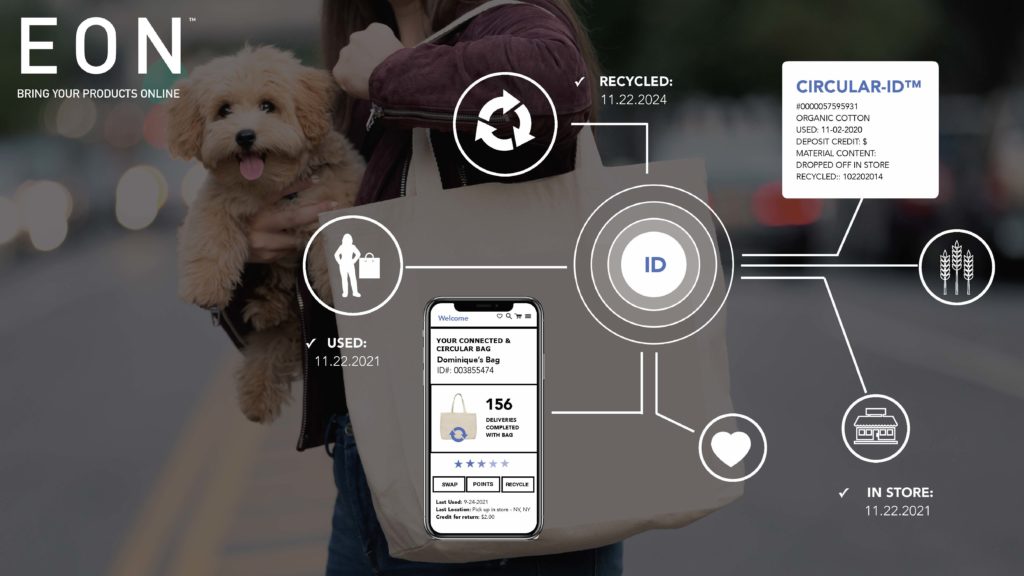
SmartC, a solution co-created by 99Bridges and Envision Charlotte, leverages IoT technologies to connect reusable bags, enabled by smart tags, at participating retail stores, allowing retailers to reward customers with points, coupons or discounts every time they reuse their shopping bags.
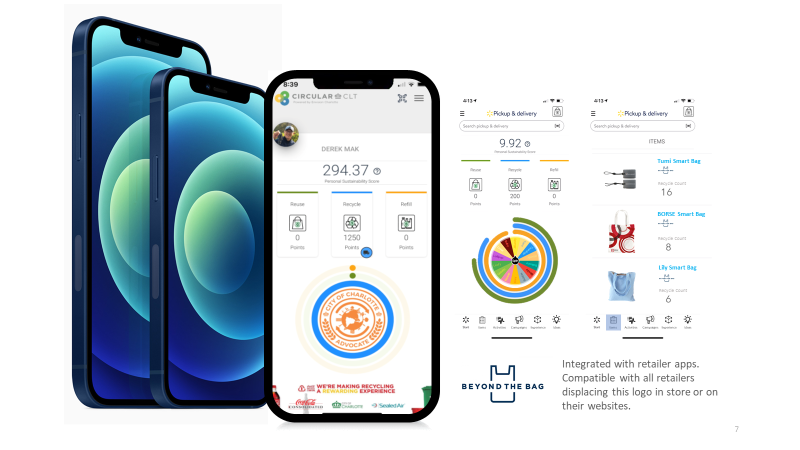
And what about all the existing reusable bags sitting in our closets? Fill it Forward created a tag that connects our bags to a mobile app where users track their environmental impact, help give back to charitable projects, and offer rewards that encourage reuse—significantly extending a bag’s lifetime.
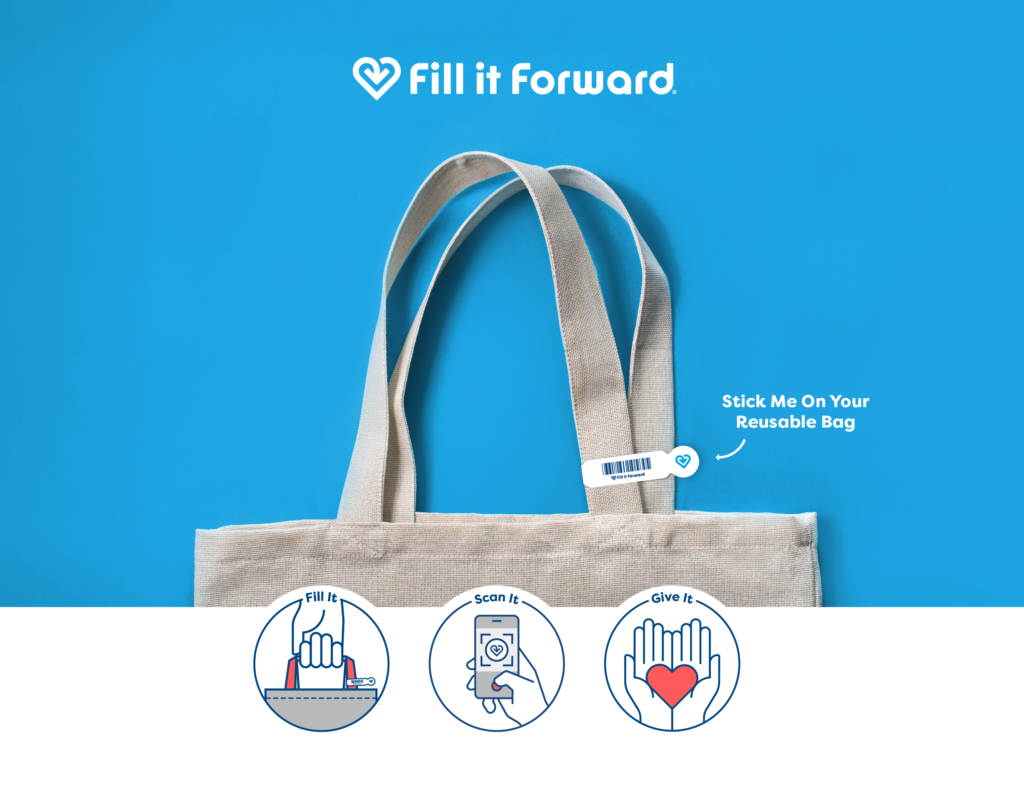
Meeting customer needs
Amidst a changing retail environment, these innovations recognize that habits are difficult to break, and to address this challenge, they have innovated around our lifestyles. Their Reuse models offer durable alternatives to the current retail bag, improving on the user experience not only from a performance standpoint, but from an environmental perspective too.
GOATOTE offers a kiosk system that provides us easy access to clean reusable bags, solving for those moments you do not have a reusable bag, but don’t want the trade-off of a single-use alternative offered at the store.
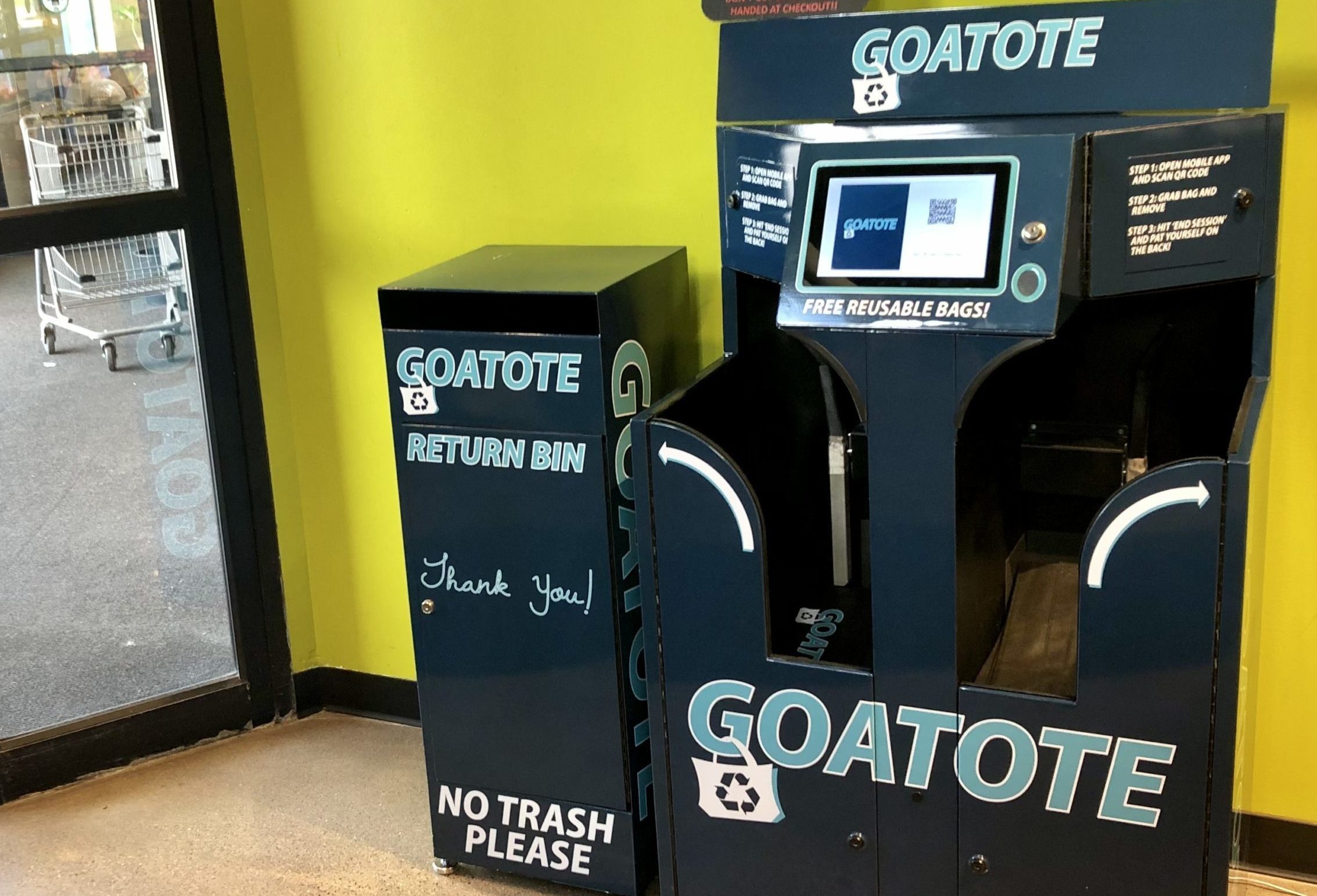
ChicoBag aims to have lightweight, compact, reusable bags readily available for a variety of customer interaction points––delivery, curb-side pick-up or in-store.
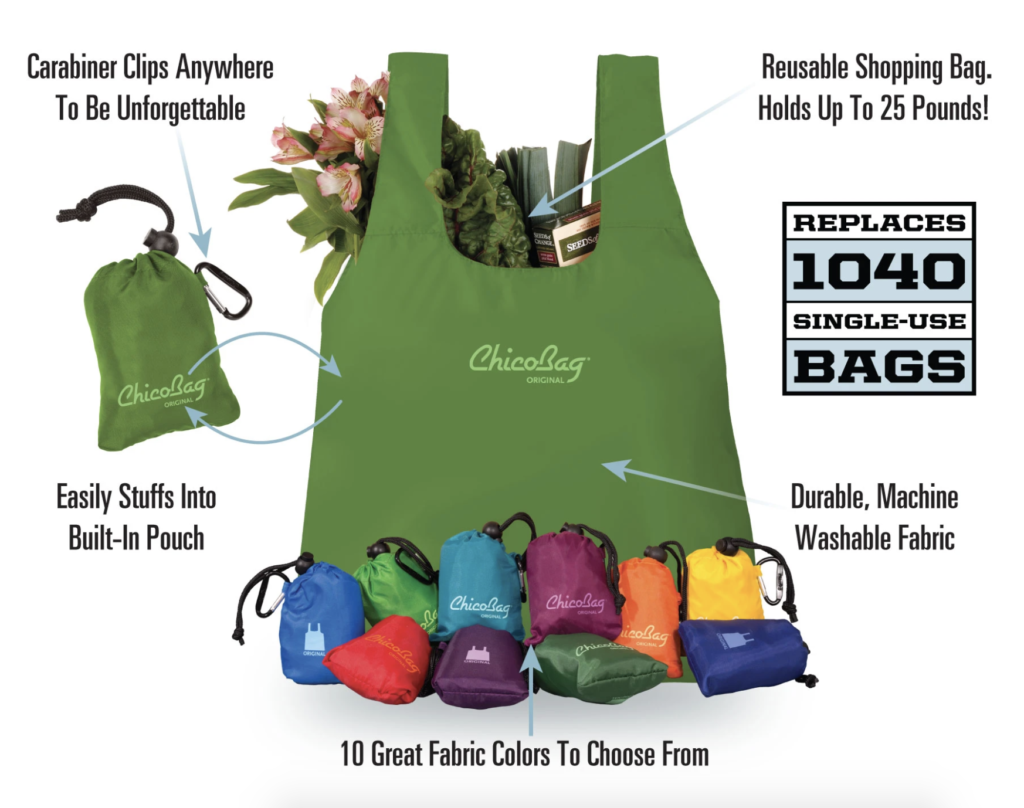
For those who shop online or use pick-up services, Returnity designs and manufactures reusable shipping bags and boxes for products already on the market, and provides the e-commerce and delivery packaging system that powers how these bags and boxes are used.
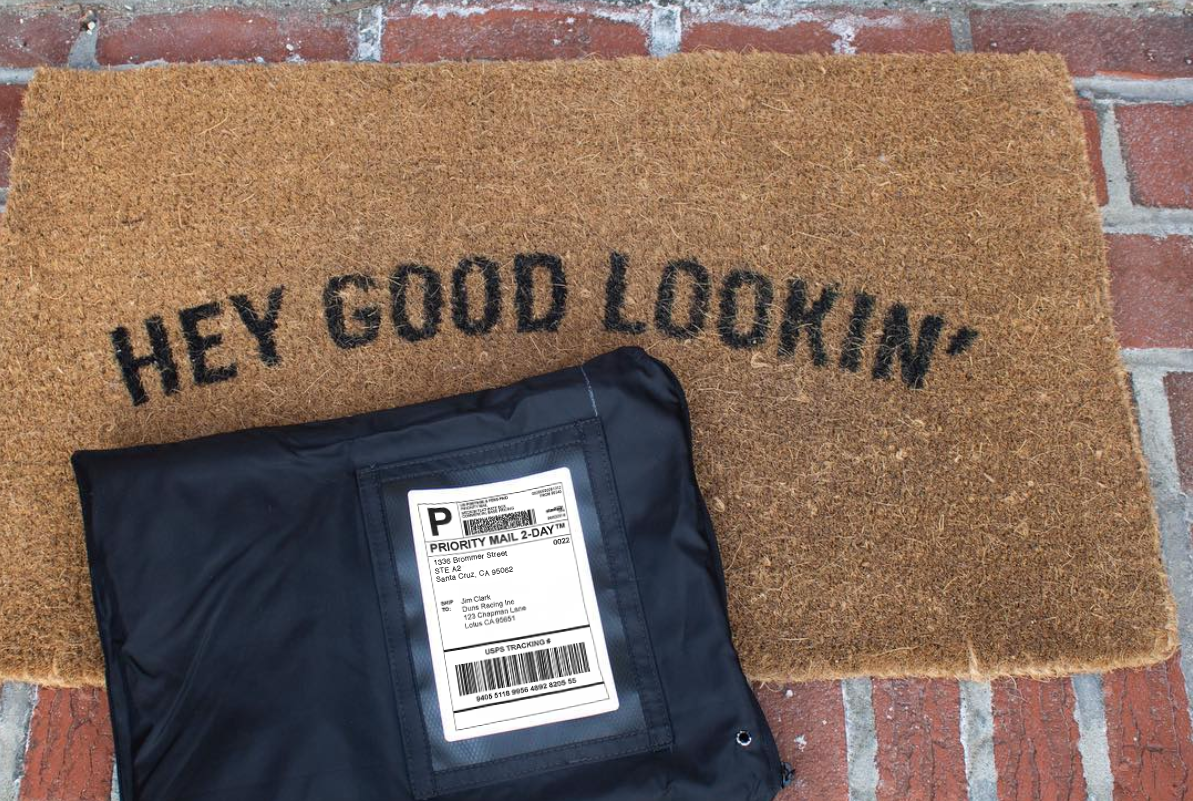
Aligning with existing retail operations
Some emerging innovators are focusing on material science innovations that result in bags that are indistinguishable from today’s plastic bag to a customer or retailer at checkout, but are sourced from renewable materials and follow different paths at end of use.
To replace traditional thin film plastics, Sway offers a seaweed-derived material that is bio-based and has the potential to be carbon-negative at scale. Their replacement matches the strength and performance of traditional plastic bags.
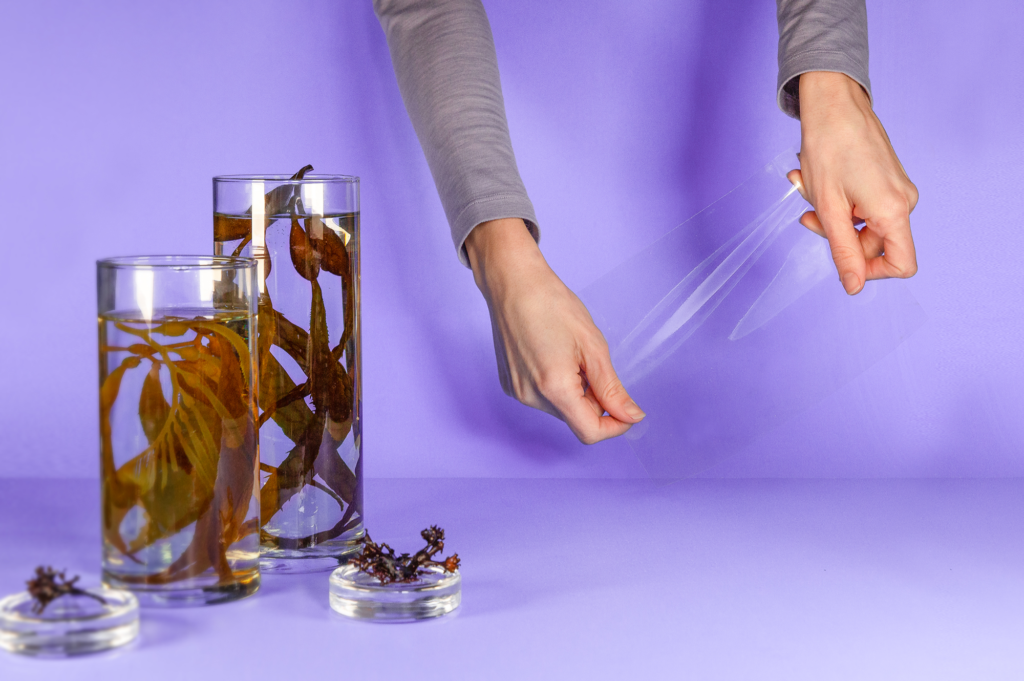
PlasticFri, on the other hand, sources starch from agricultural waste, creating a bio-based, compostable bag.
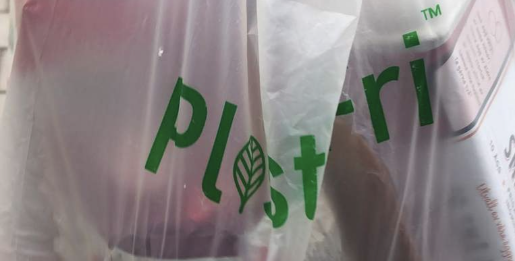
As an upgrade to traditional paper bags, Domtar is developing a new bio-based, recyclable material of 100% cellulose fiber that is stretchable and stronger, able to stand up to multiple uses. When considering which type of materials to introduce to a location, it is equally important to assess the availability of local curbside organics collection and anaerobic digestion and composting facilities, to ensure that these bags can be processed at end-of-life.
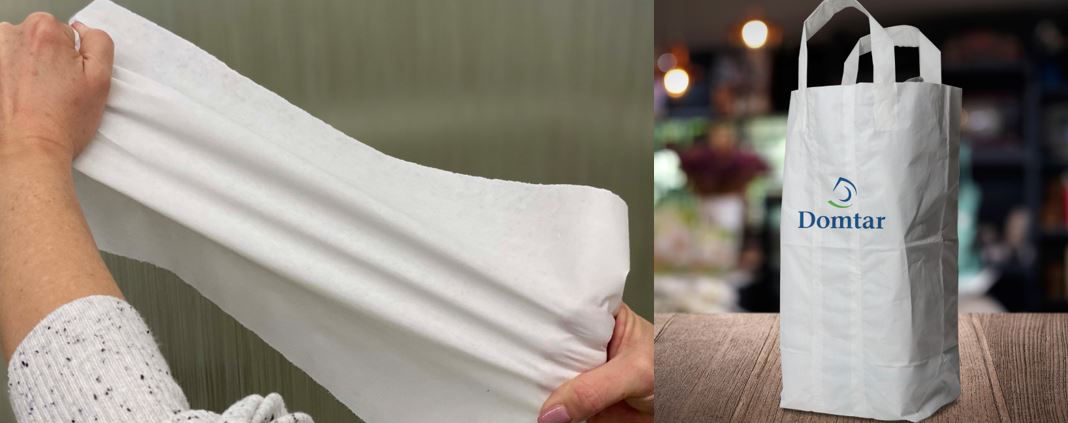
Today, the outsized impact of plastic bag waste demands innovative solutions. However, as companies work toward zero-waste goals, the packaging of items that go inside the bag is also an important consideration. In recognition of this, we are giving special recognition to two Beyond the Bag Challenge submissions as Circular Trailblazers. These companies are advancing refillable and reusable packaging systems for products across retail, from food to cleaning supplies, broadening the horizon for the waste-free future of retail. Algramo, a start-up based in Chile and now piloting in New York, has created a mobile dispensing system for personal care and cleaning products that allows shoppers to skip packaging all together. Loop, developed by TerraCycle, creates reusable and recyclable packaging alternatives for some well-known household products, eliminating the need for single-use packaging when customers visit a store, or deliver these items to their homes.
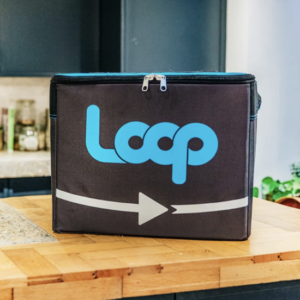 .
. 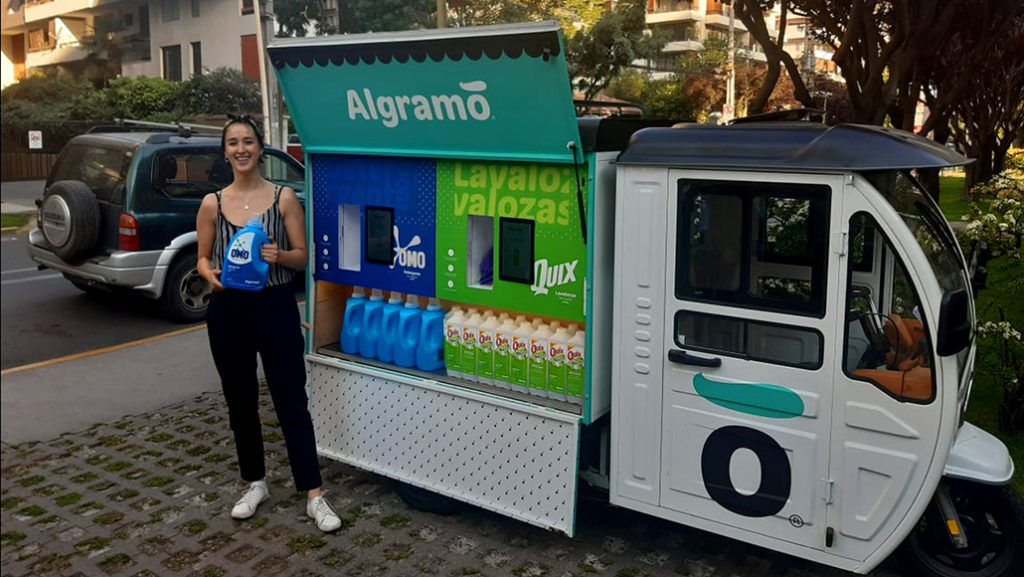
There is no one replacement for the current single-use bag––the solution lies in a combination of approaches that can fit into diverse retail markets. And it’s critical to test these solutions. The nine winners of the Beyond the Bag Challenge––Chicobag, Domtar, EON, Fill it Forward, GOATOTE, PlasticFri, Returnity, SmartC and Sway––need further investment, refining and piloting to help set them up for success, with support from the retail partners who came together to create the Consortium to Reinvent the Retail Bag. We look forward to the exciting work ahead to assess how these solutions can align with customer needs, the growing demand for circular solutions, and the changing face of retail.
Closed Loop Partners joins with CVS Health, Target & Walmart to Announce Winners of “Beyond the Bag” Innovation Challenge
The Consortium to Reinvent the Retail Bag enters next phase: testing and piloting new design solutions to combat plastic waste
NEW YORK, Feb. 16, 2021 /PRNewswire/ — The Center for the Circular Economy at Closed Loop Partners announces the nine winners of the Beyond the Bag Challenge: ChicoBag, Domtar, Eon, Fill it Forward, GOATOTE, PlasticFri, Returnity, SmartC and Sway. The winning solutions fall into three categories: Reuse and Refill; Enabling Technology; and Innovative Materials. Their work ranges from reusable packaging systems, to technology that incentivizes consumers to make the sustainable choice, to bags derived from seaweed or agricultural waste. The winners now enter the next phase of the initiative: working closely with the Consortium to prototype, refine and test the viability of their designs to scale as long-term solutions.
It is estimated that we use 100 billion plastic bags per year in the U.S. alone and less than 10 percent are recycled; the convenience of single-use plastics has had far-reaching consequences for the planet. Single-use plastic bags continue to be one of the top 10 items found along beaches and waterways according to data from Ocean Conservancy’s International Coastal Cleanup. The global threats brought about by climate change and the pandemic have only underscored the urgency of addressing our current system.
The Consortium to Reinvent the Retail Bag is a pre-competitive collaboration committed to reimagining the retail bag and creating a more circular delivery system. Unveiled in July 2020, the Consortium’s Beyond the Bag Initiative is an ambitious three-year undertaking that aims to identify and scale innovative alternatives to the single-use plastic retail bag. Consortium Founding Partners CVS Health, Target and Walmart committed $15 million collectively to the bold collaboration, with the goal of driving transformational change. The Consortium has welcomed additional partners DICK’S Sporting Goods, Dollar General, The Kroger Co., The TJX Companies, Inc., Ahold Delhaize USA Brands, Albertsons Companies, Hy-Vee, Meijer, Wakefern Food Corp., and Walgreens, who have joined in its mission.
“There is no one-size-fits-all solution to tackle a problem as complex as our reliance on single-use plastic bags,” says Kate Daly, Managing Director of the Center for the Circular Economy at Closed Loop Partners. “The diversity of our winners underscores how businesses and consumers alike need to employ a range of solutions to fit different geographic, social and economic contexts. We’re thrilled to announce these companies entering the next phase of the initiative, as we continue to support their growth and begin to implement select pilot programs.”
The Center for the Circular Economy at Closed Loop Partners offers a holistic approach to tackling complex challenges to the circular economy, by operating across every point of the value chain. This enables the Center and its partners to better understand the diversity of needs across multiple sectors, enhance buy-in from key players and identify opportunities. The Center is a place where competitors and peers alike can join for a common purpose.
“It is exciting to see the potential of our efforts to reimagine the single-use bag in action as we unveil these innovative solutions,” says Eileen Howard Boone, Senior Vice President, Corporate Social Responsibility and Philanthropy, CVS Health. “We look forward to exploring opportunities to pilot these solutions at CVS Pharmacy locations.”
The Beyond the Bag Challenge is only the first step. The Center and its partners are committed to a measured, data-driven approach to test and scale viable, long-term solutions that bring value to the entire system.
“We know that tackling this challenge requires a holistic approach to best serve the needs of people, the business, and the planet,” says Amanda Nusz, Senior Vice President of Corporate Responsibility, Target. “We’re excited by the nine winners – together they offer a compelling range of possibilities and inspiring potential solutions to this urgent and necessary work.”
“We’re proud to be part of a collaborative endeavor like the Beyond the Bag Initiative,” says Jane Ewing, Senior Vice President Sustainability, Walmart. “The Beyond the Bag Challenge winners inspire us to reimagine a more sustainable future, showcasing the breadth and tangibility of innovative solutions and we look forward to supporting them in their development.”
The Selection Process
The Beyond the Bag Challenge, in partnership with the global design firm IDEO, sought to identify long-term solutions that reimagine how to get goods home from an in-store purchase, from curbside pick-up, and in-home delivery. Over 450 innovators from around the world submitted their ideas on how to reinvent the retail bag. The Consortium then selected a shortlist of 58 concepts to explore deeper, and ultimately selected a cohort of 9 Winners.
Winners were chosen through a collective process by a panel of 10 subject matter experts alongside the Consortium’s Founding Partners, Sector Lead Partners, Environmental Advisory Partners and the Center for the Circular Economy at Closed Loop Partners. A comprehensive set of criteria addressed three overarching areas:
- People: it must maintain the convenience, efficiency and effectiveness of the single-use plastic bag for customers and retail employees alike. It must take into account accessibility and inclusivity.
- Business: it must have attainable, long-term value for retailers in a variety of environments.
- Planet: it must operate within a circular system and lessen or eliminate environmental and social harm in its sourcing, production, useful life and end-of-life.
These principles are equally important when looking to scale and implement systems that change how we transport items from businesses to home. The Beyond the Bag Initiative thinks outside the box, seeking solutions that align the interests of people, the planet and business.
The Next Phase
Winners will receive a portion of $1 million in prize money and are eligible for additional financial support to support testing, piloting and scaling efforts. Depending upon the type of solution, they will either be invited to join the Circular Accelerator, a mentorship program to further hone and advance their solutions, or begin product testing to improve performance, customer experience and more. The Consortium will work closely with winning solutions throughout 2021, supporting design research, prototyping, mentoring and iterative developments toward piloting select solutions in-market.
About the Center for the Circular Economy at Closed Loop Partners
The Center for the Circular Economy at Closed Loop Partners unites competitors to tackle complex material challenges and to implement systemic change that advances the circular economy. Adept at navigating every step in the value chain, Closed Loop Partners brings together designers, manufacturers, recovery systems operators, trade organizations, municipalities, policymakers and NGOs to create scalable innovations that target big system problems.
The Center’s first initiative, the NextGen Consortium, assembled leading food and beverage companies, including McDonald’s and Starbucks, to identify and commercialize a widely recyclable, compostable and/or reusable cup. 12 winning cup solutions were selected and the Consortium is supporting the testing of these new solutions as well as conducting select pilots to accelerate their path to scale. Learn more about the Center’s work here.
About the Consortium to Reinvent the Retail Bag
The Beyond the Bag Initiative, launched by the Consortium to Reinvent the Retail Bag, aims to identify, pilot and implement viable design solutions and models that more sustainably serve the purpose of the current retail bag. Closed Loop Partners’ Center for the Circular Economy launched the initiative with Founding Partners CVS Health, Target and Walmart. The Kroger Co. joined as Grocery Sector Lead Partner, DICK’S Sporting Goods joined as Sports & Outdoors Sector Lead Partner, Dollar General as Value Sector Lead Partner and TJX as Apparel & Home Goods Sector Lead Partner. Ahold Delhaize USA Brands, Albertsons Companies, Hy-Vee, Meijer, Wakefern Food Corp., and Walgreens are Supporting Partners, and Conservation International and Ocean Conservancy serve as Environmental Advisory Partners. IDEO is the Consortium’s Innovation Partner. Learn more about the Consortium here.
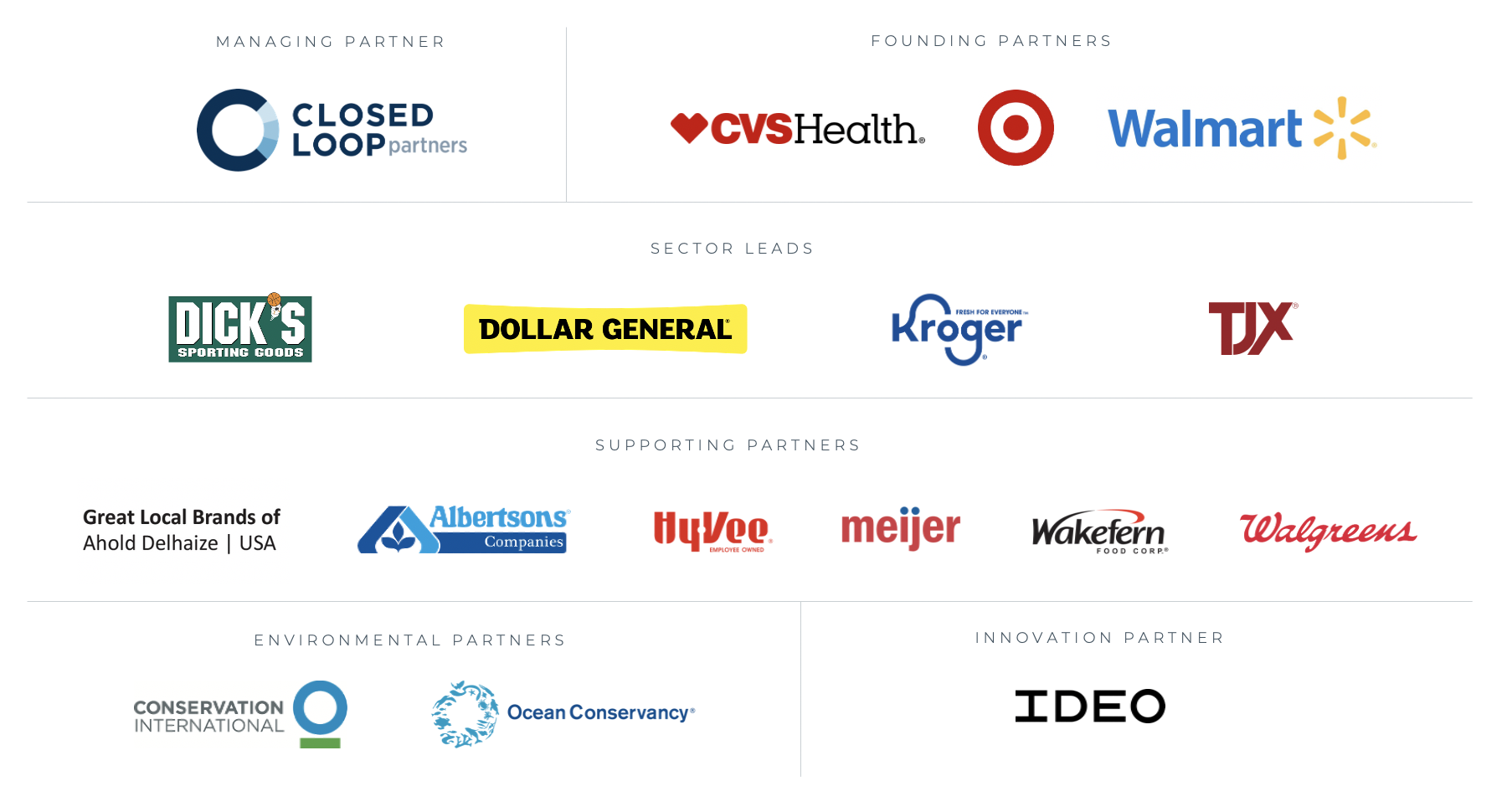
Contact: [email protected]
Wakefern Next to Venture ‘Beyond the Bag’
February 12, 2021
Wakefern Food Corp. has become the latest grocer to join the Consortium to Reinvent the Retail Bag and its Beyond the Bag Initiative, a collective effort with the goal of identifying, testing and scaling design solutions to create a more sustainable retail bag.
“For more than four decades, the Wakefern cooperative has supported sustainability through efforts such as recycling plastic bags and other materials, reducing food waste, and implementing energy-efficient technology at retail and in our distribution centers,” said Karen Meleta, Wakefern’s chief communications officer. “Encouraging our customers to use reusable bags to shop and reducing dependency on single-use plastic and traditional paper bags is another important part of our commitment to the environment. We believe the best bag is a reusable bag, and we are proud to work with fellow consortium partners and innovators to create an even better retail bag and further advance our waste reduction initiatives.”
Launched in 2020, Beyond the Bag is a three-year effort to create sustainable and cost-effective retail bag solutions. The initiative unites major retailers as consortium partners, among them founding partners CVS Health, Target and Walmart, alongside other partners Dick’s Sporting Goods, Dollar General, Kroger, Albertsons Cos., Hy-Vee, Meijer and Walgreens. The consortium also works with such stakeholders as suppliers, materials recovery facilities, municipalities and advocacy groups to collectively identify viable market solutions that can scale and bring value to retailers, customers and end markets. Taking a holistic approach to identify and scale affordable, accessible and less wasteful retail bag alternatives, Beyond the Bag spans various complementary workstreams, driving innovation, advancing materials recovery through infrastructure investments, and seeking best practices for policy and engaging consumers.
Wakefern’s supermarket banners already offer a range of reusable bags.
“Wakefern’s connection to the communities its stores serve, and its alignment with the consortium’s broader vision, lays the essential foundation for meaningful impact at scale,” said Kate Daly, managing director of the Center for the Circular Economy at New York-based investment firm Closed Loop Partners, which launched the consortium. “We are thrilled to welcome Wakefern Food Corp. to the consortium to help build more pathways for collaboration that will create and incentivize sustainable, long-term change for retail.”
The largest retailer-owned cooperative in the United States, Keasbey, New Jersey-based Wakefern Food Corp. comprises 50-plus members that independently own and operate more than 350 supermarkets under the ShopRite, The Fresh Grocer, Price Rite Marketplace, Gourmet Garage and Dearborn Market banners in New Jersey, New York, Connecticut, Pennsylvania, Maryland, Delaware, Massachusetts, Rhode Island and New Hampshire. The company is No. 25 on The PG100, Progressive Grocer’s2020 listing of North America’s top retailers of food and consumables. Walmart, Kroger, Walgreens, CVS Health, Target, Albertsons, Dollar General, Meijer and Hy-Vee are Nos. 1,3, 4, 6, 7, 8, 16, 19 and 33, respectively, on PG’s list.
Originally published in Progressive Grocer
Dollar General Joins the Beyond the Bag Initiative as Value Sector Lead Partner
February 04, 2021
DG’s 17,000+ stores to serve as key partner in exploring more sustainable solutions to reinvent the retail bag
GOODLETTSVILLE, Tenn.–(BUSINESS WIRE)–Dollar General (NYSE: DG) announced today its commitment to join the Consortium to Reinvent the Retail Bag as its Value Sector Lead Partner. The Consortium, through its Beyond the Bag Initiative, aims to identify, test and implement viable design solutions that can more sustainably serve the purpose of the current plastic retail bag.
The Center for the Circular Economy at Closed Loop Partners launched the initiative to replace the current retail bag in July 2020 and currently has multiple work streams to spur innovation, identify best practices for policy and engage consumers. Recently, the Consortium announced 58 shortlisted solutions from the Beyond the Bag Challenge, selected from 450+ submissions from more than 60 countries. Challenge winners will be announced soon.
As a Sector Lead Partner, Dollar General will direct priorities and activities for the Beyond the Bag Initiative in the context of the value sector of retail. DG and its more than 17,000 stores across 46 states will explore viable solutions resulting from the Beyond the Bag Challenge and recommend ways in which these solutions can align with the operations of existing stores and customer needs.
“Dollar General’s desire to be good stewards of our communities while reducing our environmental impact through sustainable and business-friendly practices inherently aligns with the Consortium’s vision for a more sustainable retail industry,” says Steve Sunderland, Dollar General’s executive vice president of store operations. “We understand industry-wide changes and innovative approaches need to be considered, and we look forward to working with Closed Loop Partners and the winning solutions to explore viable alternatives to the current retail bag.”
“We are delighted to welcome Dollar General to the Consortium to Reinvent the Retail Bag, joining our Founding Partners CVS Health, Target and Walmart, alongside other leading retailers to pave the way forward for a more sustainable future for retail,” says Kate Daly, Managing Director of the Center for the Circular Economy at Closed Loop Partners. “As an innovator in the sector, Dollar General’s commitment is critical to making circular solutions more widely available, while addressing the challenges of the single-use bag.”
Approximately 100 billion single-use plastic bags, typically made of non-renewable fossil fuels, are used in the U.S. annually, and less than 10% of these are recycled. These bags have also become among the top 10 items found on beaches and waterways around the world, impacting the planet, people and businesses. To learn more about the Consortium to Reinvent the Retail Bag, visit www.beyondthebaginitiative.com.
About Dollar General Corporation
Dollar General Corporation has been delivering value to shoppers for more than 80 years through its mission of Serving Others. Dollar General helps shoppers Save time. Save money. Every day!® by offering products that are frequently used and replenished, such as food, snacks, health and beauty aids, cleaning supplies, basic apparel, housewares and seasonal items at everyday low prices in convenient neighborhood locations. Dollar General operated 16,979 stores in 46 states as of October 30, 2020. In addition to high-quality private brands, Dollar General sells products from America’s most-trusted manufacturers such as Clorox, Energizer, Procter & Gamble, Hanes, Coca-Cola, Mars, Unilever, Nestle, Kimberly-Clark, Kellogg’s, General Mills, and PepsiCo. Learn more about Dollar General at www.dollargeneral.com.
About the Consortium to Reinvent the Retail Bag
The Beyond the Bag Initiative, launched by the Consortium to Reinvent the Retail Bag, aims to identify, pilot and implement viable design solutions and models that more sustainably serve the purpose of the current retail bag. Closed Loop Partners’ Center for the Circular Economy launched the initiative with Founding Partners CVS Health, Target and Walmart. Kroger joined as Grocery Sector Lead Partner, DICK’S Sporting Goods as Sports & Outdoors Sector Lead Partner, Dollar General as Value Sector Lead Partner, and Albertsons Companies, Hy-Vee, Meijer, and Walgreens as Supporting Partners, alongside Conservation International and Ocean Conservancy as Environmental Advisory Partners. OpenIDEO is the Consortium’s Innovation Partner. Learn more about the Consortium here.
Contacts
Crystal Ghassemi
Media Hotline: 1-877-944-DGPR (3477)
[email protected]
Albertsons Companies Joins Beyond the Bag Initiative
January 25, 2021
Goals include reducing use of virgin materials, scaling new solutions, diverting bags from landfills; efforts complement plastic reduction work already underway at Albertsons Cos.
BOISE, Idaho–(BUSINESS WIRE)–Albertsons Companies today announced that it has joined the Beyond the Bag Initiative, its latest step to contributing to efforts to reduce plastic waste.
The Beyond the Bag Initiative, launched by the Consortium to Reinvent the Retail Bag, is a multi-year collaboration across retail sectors that aims to identify, test, and implement innovative new design solutions that serve the function of today’s single-use plastic retail bag, delivering ease and convenience for consumers while striving to lessen the impact on the environment.
“Albertsons Cos. has a passion for innovation and shares Beyond the Bag’s vision of reinventing the single-use retail bag,” said Suzanne Long, Group Vice President of Strategic Sourcing & ESG. “Ensuring our products are better for our communities and the planet is a priority for us. We look forward to working with the Beyond the Bag Initiative to help create a more sustainable future.”
The Beyond the Bag Initiative has several foundational goals:
- Reduce the use of virgin materials from natural resources and greenhouse gases emitted from the production and recovery of bag solutions
- Identify and scale innovative new design solutions to create a system that serves the function of the current retail bag
- Increase the percentage of retail bags diverted from landfills
- Inspire and engage people to imagine new possibilities for the retail bag system
Convened by The Center for the Circular Economy at Closed Loop Partners, the Consortium includes retailers, environmental advisory partners, and third-party experts. Last summer, the Consortium launched a global innovation challenge to identify solutions to replace the current plastic bag, inviting entrepreneurs, designers, suppliers, and problem-solver to submit solutions. The Consortium expects to announce winning concepts in February. Eligible winners will receive funding, assistance in scaling, and get access to testing and potential piloting opportunities.
“It’s time for us to think beyond the status quo and reinvent the ubiquitous retail bag for a more sustainable future,” says Kate Daly, Managing Director of the Center for the Circular Economy at Closed Loop Partners. “We’re thrilled to welcome Albertsons Cos. into this consortium of leading retailers. Together, we can create impact at scale and tackle the challenge of plastic bag waste that spans companies and sectors.”
Throughout the next few years, Albertsons Cos. will continue to work on its own initiatives as well as collaborate with Consortium Partners to provide solutions for how to transport groceries home in a way that is both convenient for customers and more sustainable for the environment. The Consortium includes the three Founding Partners CVS Health, Target, and Walmart, as well as Kroger, DICK’s Sporting Goods, Hy-Vee, Meijer and Walgreens.
More information about the Beyond the Bag Initiative and its retail partners can be found here.
Additional plastic reduction efforts already underway at Albertsons Cos:
- Plastics and Packaging Pledge: Albertsons Cos. announced its Plastics and Packaging Pledge in April 2019 to advance sustainability and reduce plastic waste throughout the company and its banners, starting with its operations and its extensive Own Brands portfolio. Among the commitments is a pledge to ensure 100 percent of its Own Brands packaging is recyclable, reusable, or industrially compostable by 2025. The company has also committed to decreasing its overall plastic usage, with an emphasis on single-use plastics. More information about the company’s Plastics and Packaging Pledge can be found at www.albertsons.com/plasticspledge.
- Reusable bags made with recycled bags and plastic film: Select stores offer reusable shopping bags that are produced through a closed-loop process that produces bags made from 65 percent recycled material, including a minimum of 40 percent post-consumer waste. Some of this recycled material comes from plastics that customers recycle in the stores and the company’s own operations.
- Reusable bags made from ocean-bound plastic: The company’s Southern California stores offer bags made with up to 90 percent post-consumer plastics that would otherwise end up in oceans and waterways. Each bag is created from material that has been traced through the entire supply chain – from collection to production.
- Efforts to reduce single-use bags: The company is proactively working to decrease double-bagging and increasing the number of items in each bag while still protecting the groceries inside the bag. The plastic bags come with a printed reminder to reminder to recycle bags; many stores offer drop-off bins for single-use plastic bins to help customers recycle their bags.
About Albertsons Companies
Albertsons Companies is a leading food and drug retailer in the United States. The company operates stores across 34 states and the District of Columbia under 20 well-known banners including Albertsons, Safeway, Vons, Jewel-Osco, Shaw’s, Acme, Tom Thumb, Randalls, United Supermarkets, Pavilions, Star Market, Haggen and Carrs. Albertsons Cos. is committed to helping people across the country live better lives by making a meaningful difference, neighborhood by neighborhood. In 2019 alone, along with the Albertsons Companies Foundation, the company gave $225 million in food and financial support. In 2020, Albertsons Cos. made a $53 million commitment to community hunger relief efforts and a $5 million commitment to organizations supporting social justice. These efforts have helped millions of people in the areas of hunger relief, education, cancer research and treatment, social justice and programs for people with disabilities and veterans’ outreach.
About the Consortium to Reinvent the Retail Bag
The Beyond the Bag Initiative, launched by the Consortium to Reinvent the Retail Bag, aims to identify, pilot and implement viable design solutions and models that more sustainably serve the purpose of the current retail bag. Closed Loop Partners’ Center for the Circular Economy launched the initiative with Founding Partners CVS Health, Target and Walmart. Kroger joined as Grocery Sector Lead Partner, DICK’S Sporting Goods as Sports & Outdoors Sector Lead Partner and Albertsons Companies, Hy-Vee, Meijer, and Walgreens as Supporting Partners, alongside Conservation International and Ocean Conservancy as Environmental Advisory Partners. OpenIDEO is the Consortium’s Innovation Partner. Learn more about the Consortium here.
Contacts
Andrew Whelan
[email protected]
Meijer Joins Consortium to Reinvent the Retail Bag
December 17, 2020
Initiative is retailer’s latest effort to lessen its environmental impact
GRAND RAPIDS, Mich., Dec. 17, 2020 /PRNewswire/ — Meijer announced today that it’s joined the Beyond the Bag Initiative aimed at identifying, testing and implementing sustainable solutions to move beyond the single-use plastic bag.
It’s among the retailer’s latest efforts to reduce waste and improve recycling, said Vik Srinivasan, Senior Vice President of Properties and Real Estate.
“Meijer operates under the philosophy that to be a good company, we must be a good neighbor,” Srinivasan said. “We are committed to lessening our impact on the environment and believe our participation in this initiative is an important step in keeping our communities clean for generations to come.”
Meijer is among numerous other retailers industrywide that are partnering in the Beyond the Bag Initiative that launched earlier this year by Closed Loop Partners’ Center for the Circular Economy. The 3-year collaboration is working to find a replacement for the single-use plastic bag that’s functional, easy for customers to use and better for the environment. The initiative also engages with stakeholders, including suppliers, materials recovery facilities, municipalities, advocacy groups and others to support this collaborative approach designed to promote viable market solutions that can be scaled, and bring value to retailers and customers.
“The scale of the challenge is vast, with single-use plastic bags used widely across industries, sectors and geographies,” said Kate Daly, Managing Director of the Center for the Circular Economy at Closed Loop Partners. “Addressing a systemic waste challenge requires bringing stakeholders together to solve for a shared challenge. That’s why we’re thrilled to have Meijer join the Consortium to Reinvent the Retail Bag, alongside CVS Health, Target, Walmart, DICK’S Sporting Goods, Kroger, Hy-Vee and Walgreens. Together, we are thinking outside the box and collectively reinventing the retail bag, and we encourage other retailers to join us.”
Meijer has made significant strides in recent years regarding its commitment to sustainable practices and the reduction of plastic waste in our environment, said Erik Petrovskis, Director of Environmental Compliance and Sustainability for Meijer. For example:
- In January 2020, Meijer opened its first small format store, Woodward Corner Market, without single-use plastic bags. However, due to the coronavirus pandemic, the use of reusable bags has been restricted with the exceptions of customers using the company’s Shop & Scan technology and at self-checkouts.
- Since 2014, each Meijer store has placed collection bins inside its front entrance vestibules for customers to deposit clean, dry plastic bags and films, including single-use, bread, dry cleaning, produce and water softener bags. This year, Meijer expects to recycle 6 million pounds of plastic bags that are sent to its distribution centers for remanufacturing into decking.
- In 2019, Meijer began adding a How2Recycle label on its own brand packaging to better help customers understand how to dispose of the materials. By 2022, the How2Recycle label will be on all True Goodness by Meijer packaging.
- In 2019, Meijer set a goal that Meijer brand packaging will be made from 100 percent reusable, recyclable or compostable materials by 2025.
“Lessening our impact on the environment through increased recycling efforts is an issue that is important to us and our customers, and one that we are working diligently to address,” Petrovskis said. “I look forward to reviewing the innovative solutions that will stem from this collaboration.”
About Meijer: Meijer is a Grand Rapids, Mich.-based retailer that operates 256 supercenters and grocery stores throughout Michigan, Ohio, Indiana, Illinois, Kentucky and Wisconsin. A privately-owned and family-operated company since 1934, Meijer pioneered the “one-stop shopping” concept and has evolved through the years to include expanded fresh produce and meat departments, as well as pharmacies, comprehensive apparel departments, pet departments, garden centers, toys and electronics. For additional information on Meijer, please visit www.meijer.com. Follow Meijer on Twitter @twitter.com/Meijer and @twitter.com/MeijerPR or become a fan at www.facebook.com/meijer.
About the Consortium to Reinvent the Retail Bag
The Beyond the Bag Initiative, launched by the Consortium to Reinvent the Retail Bag, aims to identify, pilot and implement viable design solutions and models that more sustainably serve the purpose of the current retail bag. Closed Loop Partners’ Center for the Circular Economy launched the initiative with Founding Partners CVS Health, Target and Walmart. Kroger joined as Grocery Sector Lead Partner, DICK’S Sporting Goods as Sports & Outdoors Sector Lead Partner and Hy-Vee, Meijer, and Walgreens as Supporting Partners, alongside Conservation International and Ocean Conservancy as Environmental Advisory Partners. OpenIDEO is the Consortium’s Innovation Partner. Learn more about the Consortium here.
SOURCE Meijer
Related Links
The Emerging Innovations Transforming How We’ll Bring Goods Home
November 02, 2020
The Consortium to Reinvent the Retail Bag Identifies 58 Shortlisted Solutions Across Reusable Design, Innovative Materials & Enabling Technology––Paving the Way Towards a More Circular Future
The Beyond the Bag Initiative, launched by the Consortium to Reinvent the Retail Bag, aims to identify, pilot and implement viable design solutions and models that more sustainably serve the purpose of the current retail bag. Closed Loop Partners’ Center for the Circular Economy launched the initiative with Founding Partners CVS Health, Target and Walmart. Kroger joined as Grocery Sector Lead Partner, DICK’S Sporting Goods as Sports & Outdoors Sector Lead Partner, and Hy-Vee and Walgreens as Supporting Partners, alongside Conservation International and Ocean Conservancy as Environmental Advisory Partners. OpenIDEO is the Consortium’s Innovation Partner.
What does it take to reinvent the retail bag? And what solutions exist today? These are the questions we asked as we launched the Consortium to Reinvent the Retail Bag in July of this year, bringing some of the nation’s most influential retailers together to solve for the 100 billion single-use plastic bags used annually in the U.S. These bags too often end up polluting our oceans, stuck in our trees or being wasted in landfills, and it’s time that we create a better path forward.
In August, the Consortium opened the Beyond the Bag Challenge, inviting entrepreneurs, designers, suppliers and problem-solvers to submit solutions that replace the current single-use plastic bag. Through the Challenge, the Consortium brings to light future-forward, tech-enabled solutions that can help build a new system that serves the function of the retail bag in a sustainable, affordable and inclusive way––helping transport goods from store to destination in a way that aligns with diverse retail systems and delivers ease and convenience for all. Three months and more than 450 submissions later, it’s clear that an impressive range of innovative solutions exist. Challenge submissions span the globe across 60 different countries, and represent a range of company stages, from early concept startups to established, commercial businesses.
We’re seeing three broad categories of innovation emerge––reusable designs, innovative materials and enabling technology––that highlight key opportunity areas, showing the range of solutions and potentially groundbreaking ways we can change retail.
How might these solutions play out in the world? What might a sustainable retail bag system look like? After evaluating hundreds of potential solutions through the lenses of sustainability, business and technical viability, accessibility, customer behavior and alignment with reuse and recovery infrastructure, the Consortium announced today a shortlist of promising solutions for further exploration [SEE SHORTLIST HERE].
Across the Shortlist, we’re seeing three broad categories of innovation emerge––reusable designs, innovative materials and enabling technology––that highlight key opportunity areas, showing the range of solutions and potentially groundbreaking ways we can change retail. These provide a window into the future, a teaser as to what might be to come. Identifying innovation is the first step, and with the right kind of testing, honing and piloting, we can start implementing new solutions and systems at scale.
As we collectively become smarter about what the market needs, what consumers want in a retail experience and what new technologies might enable futures we can’t yet fully envision, we will seek to better understand how these and other solutions might work together to create an interconnected and informed system that will fundamentally shift the way we are currently shopping and getting goods home.
Reusable Designs Keep Materials in Play for Multiple Uses
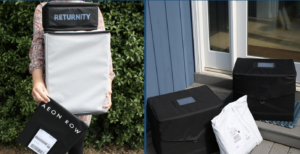
Systems-Driven Reusable Packaging Integration by Returnity
There is a growing innovation category for retail packaging centered on reuse. These solutions use durable materials that can serve the purpose of today’s single-use bag, but remain in circulation for multiple uses within a user-friendly system. Many of these solutions also involve transferring ownership back to the producers and manufacturers––shifting away from typical purchasing models and toward renting, leasing and subscription models for packaging. These include bags-as-a-service and shared-bag systems that incentivize companies to see their products or packaging as valuable assets worth investing in. Through the Challenge, we’re seeing how this broad category comes to life in a multitude of formats, especially at the initial customer interaction point––the point of sale. Solutions range from gurney-style carts that fit in the trunk of a car, to compact reusable bag withdrawal and return stations that sit at the checkout counter and continually cleaned, reusable containers that transport products directly to customers’ homes.
The innovations coming to the fore in this category have the potential to address real challenges in the retail experience. Reuse models address short-lived disposable options, extending the use time of the retail bag from today’s 12-minute average to multiple life cycles, keeping valuable materials in play at their best and highest use. However, for their full impact to be realized, it is important to dig deeper into the structures and systems that enable their long-term environmental and economic sustainability, examining reverse logistics and conducting life cycle assessments, among other areas for evaluation.
Innovative Climate-Friendly Materials Can Reduce Impacts on the Planet
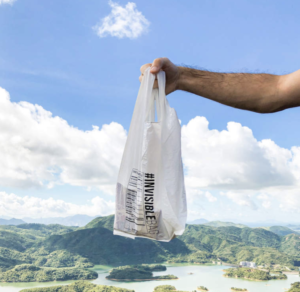
#INVISIBLEBAG by Distinctive Action Ltd
Designers today are recognizing that the materials they choose for a product determine how its entire life cycle will play out, from start to end. As a result, there is a growing focus on material science innovation, and a reevaluation of what goes into products for a carbon-free future. The Challenge has brought to light a whole host of new materials that broaden the way we think about the retail bag––aiming for superior performance that better meets the needs of a diverse range of customers, without creating an outsized impact on the environment. These solutions include stretchy fibers derived from nature, water-soluble films, biopolymers processed from agricultural waste, natural materials like algae, seaweed and chitin, and upcycled materials like cotton.
Many of these pioneering solutions draw from rapidly replenishable resources and seek to add material value at end-of-life, whether through composting or recycling systems. They diversify the resources we use to begin with, relieving pressure from just one primary source––especially fossil fuels. At the same time, we need to ensure that these new solutions don’t outpace our existing recovery infrastructure, and are actually recaptured as intended after use.
Enabling Technologies Accelerate the Uptake of Smart, Sustainable Solutions

IoT-enabled Food Delivery & Pickup System by Minnow Technologies
Beyond these innovations are the underlying technological processes and systems that create a scaffolding for other solutions or systems, opening up new exchanges with customers and working towards a bagless future. These might harness Quick Response (QR) codes and/or radio frequency identification (RFID) systems that enable companies and consumers, in effect, to check products or packaging in and out along their lifespan. This increases visibility and digital connectivity, which can drive better logistics and inventory management, informing strategic decision-making and incentivizing customers through “nudges” or reward programs. Innovative and “smart” delivery models, like in store kiosks or mobile applications, can also integrate with other categories––reusable designs or innovative materials––to deliver products.
It is critical that these solutions are able to scale commercially, align with market needs and integrate within existing systems of leading retailers, laying the groundwork for long-term change that cuts across industries.
Now, how do all of these solutions come together? From a birds eye view, the range of solutions is wide, with many of them complementary and potentially overlapping. If we take into account all of the ways we use the retail bag, and all of the different people around the world using retail bags, this diversity of thinking works to our advantage. And we know there are yet more avenues to explore. As we collectively become smarter about what the market needs, what consumers want in a retail experience and what new technologies might enable futures we can’t yet fully envision, we will seek to better understand how these and other solutions might work together to create an interconnected and informed system that will fundamentally shift the way we are currently shopping and getting goods home.
Ultimately, it may not be a single solution, or even a few that solve the problem. With ever increasing ways to purchase goods come ever increasing needs for a myriad of interventions that solve for niche sets of needs within specific customer or delivery segments. In reality, there is no panacea to this complex problem––different geographic, economic and social contexts demand varied approaches that cater to diverse sets of needs. If we are to change the future of retail, these solutions, from reuse models to innovative materials to the enabling technologies, need to communicate with and interrelate within a holistic ecosystem, explore new pathways of collaboration to fill in gaps or amplify one another’s strengths, and work to advance the market together, rather than separately.

This is just the beginning of the journey, both for solutions in the Challenge and for the Consortium collectively. In the lead up to the announcement of Challenge winners in early 2021, we’ll begin working more closely with the Shortlisted innovators, helping refine their solutions, digging deeper to understand their full economic, environmental and social impact, and exploring emerging trends. And as we begin to learn where and how these solutions might apply to today’s challenges as well as tomorrow’s, we will work to advance and implement those which can bridge this innovation gap and have an eye on adaptability and agility, or on those that might enable the successful implementation of another concept or emerging technology––all to ensure we are rolling out new ventures that not only work within the operational parameters of our Partners, but serve both customers and the market at large. Overall, it is critical that these solutions are able to scale commercially, align with market needs and integrate within existing systems of leading retailers, laying the groundwork for long-term change that cuts across industries [SEE SHORTLIST HERE].
As we enter the next phase of this initiative, we are excited to work across the Consortium’s ecosystem of emerging innovators and established retail institutions to drive toward a more inclusive, affordable and sustainable future. Join us on this journey, and stay tuned for our upcoming announcement of the final Beyond the Bag Challenge winners in early 2021.
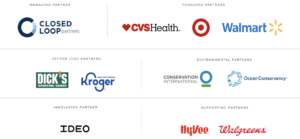
Hy-Vee Joins Closed Loop Partners and Leading Retailers to Reinvent the Single-Use Plastic Retail Bag
October 09, 2020
Hy-Vee is the seventh company to join the Beyond the Bag Initiative, alongside CVS Health, Target, Walmart, DICK’S Sporting Goods, Kroger and Walgreens
New York (Oct. 9, 2020) — Today, Hy-Vee Inc. joined the Consortium to Reinvent the Retail Bag as a Supporting Partner, alongside Founding Partners CVS Health, Target and Walmart, and joined by DICK’S Sporting Goods, Kroger and Walgreens. Closed Loop Partners’ Center for the Circular Economy launched the Consortium and its Beyond the Bag Initiative earlier this year with the aim of identifying, testing and implementing viable design solutions and models that more sustainably serve the purpose of the current retail bag.
Hy-Vee, Inc. is an employee-owned supermarket chain operating more than 275 retail stores across eight Midwestern states. “The opportunity to join the Beyond the Bag Initiative and address the shared challenges presented by single-use plastics with some of the largest and most influential retailers in our country is crucial as we remain committed to reducing our environmental impact,” said Jay Marshall, Hy-Vee’s Vice Chairman and President of Hy-Vee’s Supply Chain and Subsidiaries. “Through this collaboration, we can truly move the needle on a global waste issue and bring to life some much-needed solutions. We look forward to contributing our knowledge and insights and collectively collaborating with other Consortium Partners to pave the way for a more sustainable future.”
“We are thrilled to welcome Hy-Vee to the Consortium to Reinvent the Retail Bag. The collaborative power of our Consortium enables us to have impact at scale and accelerate the pace of innovation to find alternatives to the current retail bag,” says Kate Daly, Managing Director of the Center for the Circular Economy at Closed Loop Partners. “We continue to invite other retailers to join us and send a unified signal for transformational change to address this long-standing environmental challenge.”
The Kroger Co. is the Grocery Sector Lead Partner of the Consortium, directing priorities and activities for the initiative within the specific sector. “Our commitment to phase out single-use plastic bags across our enterprise is a critical part of our Zero Hunger | Zero Waste social impact plan,” said Lisa Zwack, Kroger’s Head of Sustainability. “We’re thrilled to welcome Hy-Vee to the Consortium and we encourage other retailers to join our search for innovative, sustainable solutions to the traditional single-use plastic bag.”
Single-use plastic bags are among the top 10 items found on beaches and waterways, and it’s estimated that we use 100 billion plastic bags per year in the U.S., contributing to a global waste challenge. The short use (12 minutes, on average) and long lifespan of the plastic bag have led to rising concerns. This is a challenge that is top-of-mind for communities and consumers who are concerned about the impact of single-use plastics on our environment and for brands who are seeking more sustainable solutions. Current alternatives can be costly and inconvenient, often trading one environmental issue for another. The retail bag needs reinventing.
In August, the Consortium launched a global innovation challenge to source solutions to replace the current plastic bag – including tech-enabled reuse models, new materials, and software and hardware innovations. The Challenge closed last week with more than 450 submissions. Consortium Partners, including retailers and Environmental Advisory Partners, alongside third-party experts will carefully review and select the Shortlist and Winners. All submissions are viewed through the lenses of sustainability, accessibility, customer behavior and alignment with reuse and recovery infrastructure. Winning concepts are eligible to receive a portion of $1 million in funding, participate in a Circular Accelerator to receive further assistance in scaling, and access testing and potential piloting opportunities.
The initiative not only brings together major retailers as Consortium Partners, but also engages with stakeholders across the bag value chain, including suppliers, materials recovery facilities, municipalities, advocacy groups and others to support this collaborative approach designed to promote viable market solutions that can scale, and bring value to retailers, customers and end markets. The Consortium takes a holistic three-year approach to identify and scale affordable, accessible and less wasteful solutions. It will aim to test and launch near term solutions early on in the Initiative, while also continuing to refine longer term solutions to ensure that the industry is designing both for today and tomorrow’s needs. The initiative spans multiple complementary workstreams, spurring innovation, advancing materials recovery through infrastructure investments, identifying best practices for policy and engaging consumers.
About Hy-Vee
Hy-Vee, Inc. is an employee-owned corporation operating more than 275 retail stores across eight Midwestern states with sales of $10 billion annually. The supermarket chain is synonymous with quality, variety, convenience, healthy lifestyles, culinary expertise and superior customer service. Hy-Vee ranks in the Top 10 Most Trusted Brands and has been named one of America’s Top 5 favorite grocery stores. The company’s more than 85,000 employees provide “A Helpful Smile in Every Aisle” to customers every day. For additional information, visit www.hy-vee.com.
About the Center for the Circular Economy at Closed Loop Partners
The Center for the Circular Economy at Closed Loop Partners convenes competitors to solve material challenges and advance the circular economy. Its first initiative, the NextGen Consortium, united leading food and beverage companies to identify and commercialize a widely recyclable, compostable and/or reusable cup. Twelve winning cup solutions were selected and the Consortium is supporting the testing and piloting of these new solutions to accelerate their path to scale. Now, in partnership with leading retailers in the United States, the focus is on the single-use plastic retail bag, a challenge and opportunity that is top-of-mind for communities and consumers concerned about the impact of single-use plastics on our environment. Learn more about the Center’s work here.
About the Consortium to Reinvent the Retail Bag
The Beyond the Bag Initiative, launched by the Consortium to Reinvent the Retail Bag, aims to identify, pilot and implement viable design solutions and models that more sustainably serve the purpose of the current retail bag. Closed Loop Partners’ Center for the Circular Economy launched the initiative with Founding Partners CVS Health, Target and Walmart. Kroger joined as Grocery Sector Lead Partner, DICK’S Sporting Goods as Sports & Outdoors Sector Lead Partner and Hy-Vee and Walgreens as Supporting Partners, alongside Conservation International and Ocean Conservancy as Environmental Advisory Partners. OpenIDEO is the Consortium’s Innovation Partner.
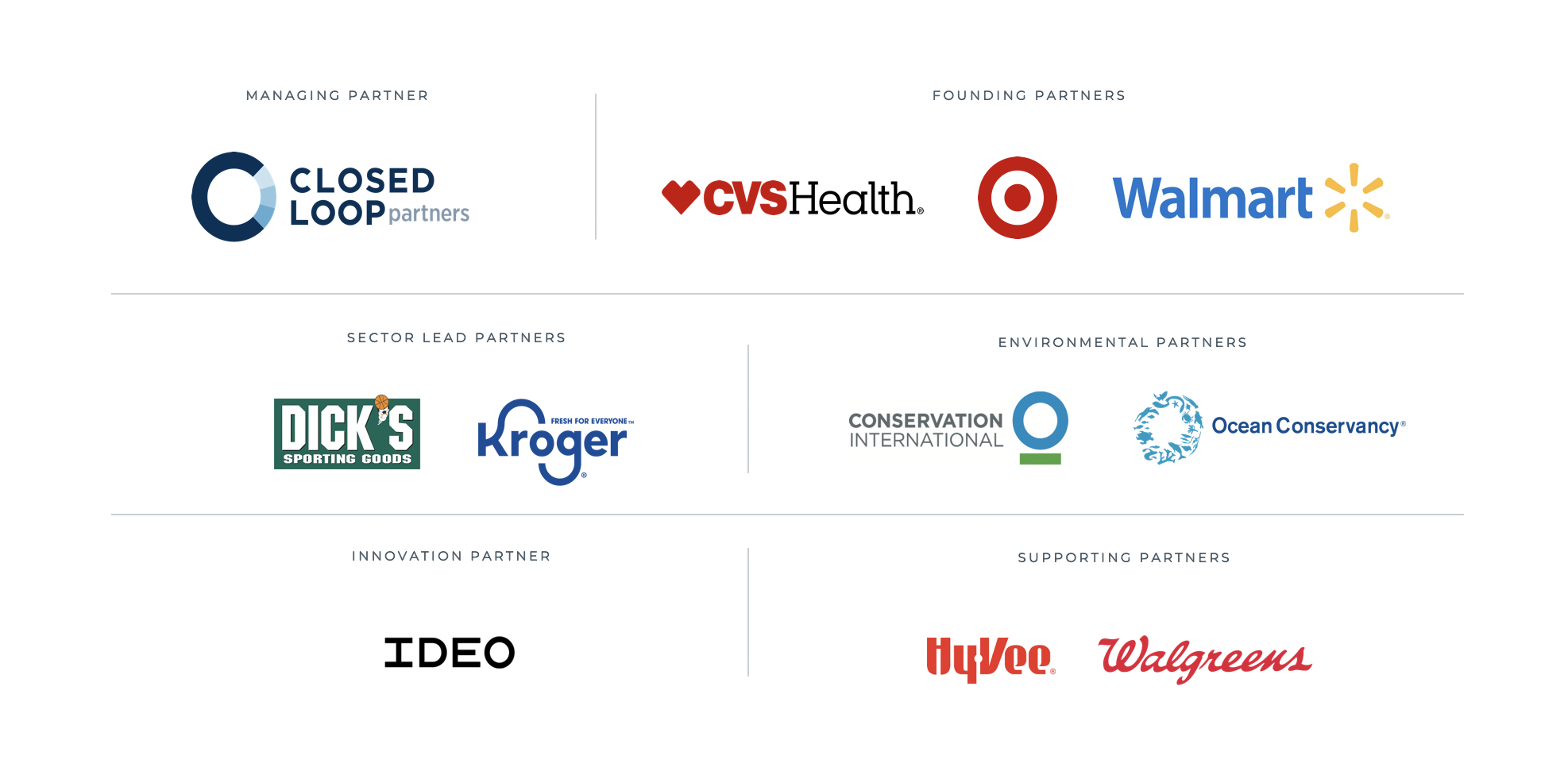
DICK’S Sporting Goods Takes Action To Create A Future Free Of Single-use Plastic Bags
September 29, 2020
DICK’S commits to eliminate all single-use point-of-sale plastic bags from its stores by 2025.
DICK’S joins a consortium of leading retailers to identify, test and implement sustainable solutions to replace single-use plastic bags through the Beyond the Bag Initiative.
PITTSBURGH, Sept. 29, 2020 /PRNewswire/ — DICK’S Sporting Goods (NYSE: DKS), the largest U.S.-based, omni-channel sporting goods retailer, today announced two major actions to help create a future free of single-use plastic bags: a commitment to remove all single-use point-of-sale plastic bags from its stores by 2025 and a partnership with Closed Loop Partners’ Center for the Circular Economy.
It’s estimated that the U.S. alone uses 100 billion plastic bags per year, and less than 10 percent of these are recycled. Single-use plastic bags are typically made from fossil fuel-derived virgin plastic and are among the top 10 items found on beaches and waterways worldwide where athletes play and explore. DICK’S has been working to reduce its environmental footprint with a recycling rate of 70% for its retail stores and operations. As a next step in this journey, the company is putting a focus on eliminating single-use retail plastic bags.
As a first step to meet this goal, DICK’S has joined the Consortium to Reinvent the Retail Bag as the lead Sports & Outdoors sector partner and will work alongside founding partners CVS Health, Target and Walmart, as well as Kroger and Walgreens. DICK’S is partnering with Closed Loop Partners’ Center for the Circular Economy, Managing Partner of the Consortium, in its quest for more sustainable solutions to replace the current retail bag through the Beyond the Bag Initiative. Closed Loop Partners launched the initiative earlier this year to identify, test and implement viable design solutions and models that more sustainably serve the purpose of the current retail bag.
“Our customers are outdoor enthusiasts who are passionate about working together to keep our planet clean and safe for future generations,” said Peter Land, Chief Communications and Sustainability Officer at DICK’S Sporting Goods. “Like our customers, we’re committed to doing what we can to prevent waste from ending up in our oceans and natural environment, and we look forward to working on the Beyond the Bag Initiative.”
The Consortium recently launched the Beyond the Bag Challenge in partnership with IDEO, which is currently accepting ideas from across the globe to re-invent the current retail bag – which could include reusable models, new materials, or software and hardware innovations that eliminate the need for bags altogether. As the Consortium’s Sports & Outdoors Sector Lead Partner, DICK’S will direct priorities and activities for the initiative within this sector.
“We want to realize a future in which waste is a thing of the past. DICK’S commitment to creating a more sustainable world for its customers makes them a perfect partner of the Consortium to Reinvent the Retail Bag,” said Kate Daly, Managing Director of the Center for the Circular Economy at Closed Loop Partners.
The Beyond the Bag Initiative takes a holistic three-year approach to identify and scale affordable, accessible and less wasteful solutions. The initiative focuses on spurring innovation, advancing materials recovery through infrastructure investments, identifying best practices for policy and engaging consumers. The Consortium aims to test and launch near term solutions to replace the current retail bag early on in the Initiative, while also continuing to refine longer term solutions to ensure that we’re designing both for today’s and tomorrow’s needs. The initiative not only brings together major retailers as Consortium Partners, but it also engages with stakeholders across the bag value chain, including suppliers, materials recovery facilities, municipalities, advocacy groups, policymakers and others to support this collaborative approach designed to promote viable market solutions that can scale and bring value to retailers, customers and end markets.
About DICK’S Sporting Goods, Inc.
Founded in 1948, DICK’S Sporting Goods, Inc. is a leading omni-channel sporting goods retailer offering an extensive assortment of authentic, high-quality sports equipment, apparel, footwear and accessories. As of August 1, 2020, the Company operated 726 DICK’S Sporting Goods locations across the United States, serving and inspiring athletes and outdoor enthusiasts to achieve their personal best through a blend of dedicated teammates, in-store services and unique specialty shop-in-shops dedicated to Team Sports, Athletic Apparel, Golf, Lodge/Outdoor, Fitness and Footwear.
Headquartered in Pittsburgh, PA, DICK’S also owns and operates Golf Galaxy and Field & Stream specialty stores, as well as GameChanger, a youth sports mobile app for scheduling, communications and live scorekeeping. DICK’S offers its products through a content-rich eCommerce platform that is integrated with its store network and provides customers with the convenience and expertise of a 24-hour storefront. For more information, visit the Investor Relations page at dicks.com.
About the Center for the Circular Economy at Closed Loop Partners
The Center for the Circular Economy at Closed Loop Partners convenes competitors to solve material challenges and advance the circular economy. Its first initiative, the NextGen Consortium, united leading food and beverage companies to identify and commercialize a widely recyclable, compostable and/or reusable cup. Twelve winning cup solutions were selected and the Consortium is supporting the testing and piloting of these new solutions to accelerate their path to scale. Now, in partnership with leading retailers in the United States, the focus is on the single-use plastic retail bag, a challenge and opportunity that is top-of-mind for communities and consumers concerned about the impact of single-use plastics on our environment. Learn more about the Center’s work here.
